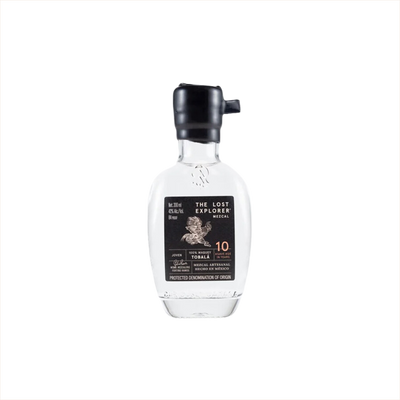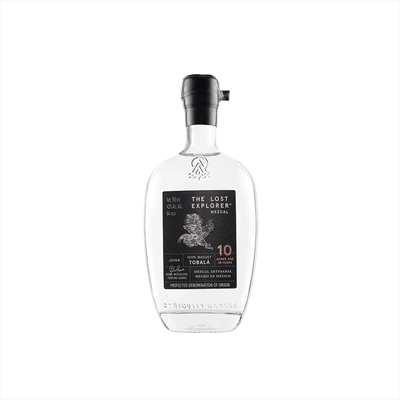Tobala Mezcal
What is Tobala Mezcal?
Tobala Mezcal represents one of the most prized expressions in the agave spirits world, made exclusively from the rare Agave potatorum that grows wild in the high-altitude regions of Oaxaca. This coveted spirit stands apart because tobala agaves take 15-20 years to mature and yield remarkably small harvests, making each bottle a testament to patience and rarity. The resulting mezcal delivers an intensely complex flavor profile with mineral-driven earthiness, bright citrus notes, and a distinctive herbaceous character that reflects the rugged mountain terrain where these precious agaves slowly develop their concentrated sugars.
Learn More About Tobala Mezcal
What makes Tobala Mezcal unique?
Tobala mezcal stands apart thanks to its wild agave source—Agave potatorum—which grows naturally in high-altitude rocky terrain and takes up to 30 years to mature, compared to 7-12 years for most cultivated agaves. This wild agave produces significantly smaller piñas, often requiring 3-4 times more plants to make the same amount of mezcal, making Tobala inherently rare and labor-intensive to produce. The result is a distinctively complex spirit with bright, floral notes and an almost perfume-like quality that's impossible to replicate with domesticated agave varieties.
How is Tobala Mezcal made?
Tobala mezcal starts with wild agave Potatorum plants that grow slowly on rocky hillsides for 15-20 years before harvest, making this spirit incredibly rare and labor-intensive to produce. The small piñas are roasted in underground stone pits fired with oak and mesquite for several days, then crushed by hand or with a traditional stone tahona wheel before fermenting in wooden vats with wild yeasts. After fermentation, the mash gets double-distilled in small copper pot stills, with master mezcaleros carefully monitoring each batch to capture the distinctive earthy, floral, and spicy notes that make tobala so prized among mezcal lovers.
How do you drink Tobala Mezcal?
Tobala mezcal deserves the neat treatment – sip it slowly at room temperature to appreciate its complex wild agave character and subtle smoky notes. While some enjoy it with a small ice cube to open up the flavors, this premium spirit is rarely wasted in shots and shines best when given proper respect. When mixed into cocktails, tobala works beautifully in mezcal negronis, smoky margarita variations, or simple preparations with citrus and agave nectar that let its unique terroir speak through.
How do I choose good Tobala Mezcal?
When selecting a Tobala mezcal, look for bottles that clearly state the producer's name and village of origin, as these wild agaves produce distinctly different flavor profiles depending on their specific terroir. For sipping neat, seek out expressions with complex mineral notes and floral aromatics that showcase Tobala's naturally delicate character, while for cocktails, consider slightly younger or more affordable options since the subtle nuances can get lost when mixed. Your budget matters too—authentic Tobala commands premium prices due to the rarity of the agave, so expect to pay $80-150+ for quality bottles, and remember that the most expensive isn't always the best for your intended use.
Nutritional Information
Typical Calorie Range per Ounce: 64-70 calories
Typical Carbohydrate Range per Ounce: 0-0.1 grams
Typical Sugar Range per Ounce: 0 grams
Typically Gluten Free: Yes
Tobalá mezcal, like other traditional mezcals made from 100% agave, contains virtually no carbohydrates or sugars since the fermentation process converts the agave's natural sugars into alcohol. The spirit derives from the wild tobalá agave plant, making it naturally gluten-free. The calorie content comes entirely from the alcohol itself, which provides approximately 7 calories per gram.
Always check the specific product label and manufacturer information to confirm gluten-free status, especially if you have celiac disease or severe gluten sensitivity. Some producers may use facilities that also process gluten-containing grains, though this is uncommon with traditional mezcal production methods.
Scrolled this far? Your reward? Tobala Mezcal Trivia!
- The Wild Child Takes 15 Years to Party: Unlike cultivated agaves that mature in 7-8 years, wild Tobala agaves grow painfully slowly in rocky, high-altitude terrain. These little rebels take 12-15 years to reach maturity, developing intensely concentrated sugars that create Tobala's signature complexity. Think of it as nature's version of aged whiskey – except the barrel is a mountainside.
- It's Called the "King of Mezcals" But Acts Like a Hermit: Tobala agaves are anti-social by nature. While other agave species form colonies and reproduce through shoots, Tobala plants grow solo and only reproduce sexually through seeds. This loner behavior means each plant develops its own unique flavor profile based on its exact microclimate – making every bottle slightly different.
- Mezcaleros Risk Their Lives for This Stuff: Harvesting Tobala often requires rappelling down cliff faces or hiking hours into remote mountain caves where the plants hide. Some grow in such precarious spots that harvesters use ropes and climbing gear just to reach them. No wonder a bottle costs what it does – someone literally risked their neck for your cocktail.
- The Piñas Are Adorably Tiny: While an Espadín agave heart can weigh 100+ pounds, a mature Tobala piña typically weighs just 15-25 pounds – about the size of a bowling ball. This means it takes roughly four Tobala plants to produce what one Espadín plant yields, explaining why Tobala mezcal commands premium prices and why bartenders guard their bottles like liquid gold.
- It Grows Where Nothing Else Will: Tobala thrives in the most hostile environments – rocky outcroppings, steep canyon walls, and nutrient-poor soils where other plants can't survive. This extreme stress creates incredibly dense, flavorful agave hearts. It's the botanical equivalent of how pressure creates diamonds, except in this case, the pressure creates one hell of a mezcal.
Higher-proof spirits can be intense. Mix carefully, taste thoughtfully, and enjoy responsibly.
Gift message (optional)


